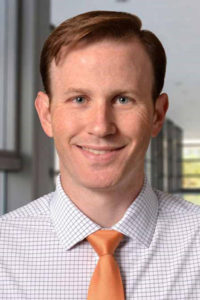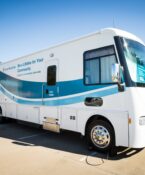MPH Online helps inform one doctor’s MD and PhD studies

Dr. Austin G. Meyer was already working on both a PhD in biochemistry and a medical degree at other Texas universities when he decided to enroll in UNT Health Science Center’s Master of Public Health online program.
“Medical school focuses primarily on anatomy and physiology, and treatments based on pathophysiology of disease,” said Dr. Meyer, now an Internal Medicine and Pediatrics resident physician at the Ohio State University College of Medicine.
“But taking it a step further – to consider population health, the social determinants of health, health policy, or to organize, collect and analyze data for clinical trials and community health studies – all of that calls for a public health perspective.”
Dr. Meyer became interested in public health during his first year of medical school, when he took on a leadership role with a free clinic managed by Texas Tech University in the Lubbock area.
“There were many areas of public health that I wanted to learn more about, such as how to interact with public health departments to set up vaccination days, how to navigate the policy landscape for a public health grant, how to develop funding for a public clinic and more,” he said. “The work I was beginning to do as a student leader in that role challenged me to look deeper into public health and how it impacts the practice of medicine.”
After his second year of medical school, he took a year off to finish his PhD.
At about that same time, the 2014 West African Ebola outbreak hit the news and quickly reached global concern levels.
With Dr. Meyer’s research on viral evolution already underway, he and a colleague were able to compare Ebola’s evolution at that point to earlier outbreaks, and to study it in contrast to other emergent viruses, like the 2009 pandemic H1N1 influenza virus, to understand whether Ebola was evolving more rapidly in 2014 than it had in the past.
As a result, they were invited to present their findings at the Ebola Modeling Workshop in Atlanta that was co-sponsored by Georgia Institute of Technology and the CDC.
“There were so many aspects of the Ebola outbreak that caught my attention as both a biochemistry researcher and a physician in training,” he said, “such as knowing how to treat the patient, how to interact with the public on a larger scale, how to contain the disease, the challenges and limitations of HAZMAT gear for emergency/medical personnel, and how to collect, organize and analyze data when situations are happening so rapidly and in numerous places.”
Doctors today, he said, are finding themselves in many different roles that call for public health knowledge and experience.
“Physicians touch on public health at almost every level. In addition to working with and sometimes for public health departments, doctors providing international aid can take on the role of community health worker, and through medical societies and advocacy efforts, physicians can impact policy,” Dr. Meyer said. “Public health is also important in reaching challenging populations to motivate better lifestyle choices related to diet, smoking, alcohol/substance use, exercise, blood pressure and cholesterol control, stress management and other conditions.”
Being able to complete the MPH online through the UNTHSC School of Public Health was a real benefit, Dr. Meyer said, to “add the context and background to complete the picture.”

![Uyen Sa Nguyen Scaled[58]](https://www.unthsc.edu/newsroom/wp-content/uploads/sites/16/Uyen-Sa-Nguyen-scaled58-145x175.jpg)



Social media